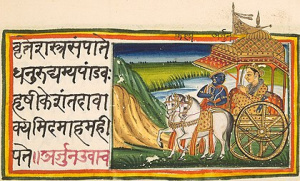Language/Sanskrit/Grammar/Plurals
Hi Sanskrit learners! 😊
In this lesson, we will learn about plurals in Sanskrit Grammar. Knowing how to form plurals is important to communicate effectively in any language. We will see how to form plurals of different types of nouns in Sanskrit. We will also discuss some interesting facts about the Sanskrit language and culture. So, let's get started!
Introduction[edit | edit source]
In Sanskrit, like in any other language, there are singular nouns and plural nouns. A singular noun refers to one person, thing, or concept, whereas a plural noun refers to more than one person, thing, or concept. In this lesson, we will learn how to form plurals of different types of nouns in Sanskrit Grammar.
With the completion of this lesson, consider investigating these related pages: Give your Opinion, How to Use "Be", Adjectives & How to Use Have.
Plural Forms[edit | edit source]
In Sanskrit, there are four types of plural forms depending upon the ending of the noun -
Ākārānta Plurals[edit | edit source]
Ākārānta Plurals are those nouns whose last letter (ending of the word) is ā, like रामा (Rāmā - Ram singular). To form a plural of such nouns, replace the last letter (ā) with the letter (ās) in the nominative singular case, which will result in the following declensions -
| Sanskrit | Pronunciation | English |
|---|---|---|
| रामाः | rāmāḥ | Rāma and others (all masculine nouns) |
| रामास्तु | rāmāstu | Rāma and others (all neuter nouns) |
Example:
- Person 1: रामः क्रीडति। (Rāmaḥ krīḍati - Rama plays.)
- Person 2: रामाः क्रीडन्ति। (Rāmāḥ krīḍanti - Rama and others play.)
Ikārānta Plurals[edit | edit source]
Ikārānta Plurals are those nouns whose last letter (ending of the word) is i, like गुरु (Guru singular). To form a plural of such nouns, replace the last letter (i) with the letter (ayaḥ) in the nominative singular case, which will result in the following declensions -
| Sanskrit | Pronunciation | English |
|---|---|---|
| गुरवः | guravaḥ | Gurus |
| गुरवोऽपि | guravo'pi | Even the Gurus (all masculine nouns) |
| गुरवस्तु | guravastu | Even the Gurus (all neuter nouns) |
Example:
- Person 1: गुरुः दूतम् दशनं ददाति। (Guruḥ dūtam daśanaṃ dadāti - The teacher gives the key to the messenger.)
- Person 2: गुरवः दूतान् दशनानि ददन्ति। (Guravaḥ dūtān daśanāni dadanti - The teachers give the keys to the messengers.)
Ukarānta Plurals[edit | edit source]
Ukarānta Plurals are those nouns whose last letter (ending of the word) is u, like नदी (nadī- river singular). To form a plural of such nouns, replace the last letter (u) with the letter (avaḥ) in the nominative singular case, which will result in the following declensions -
| Sanskrit | Pronunciation | English |
|---|---|---|
| नद्यः | nadyaḥ | Rivers |
| नद्यः शीताः | nadyaḥ śītāḥ | Cold rivers |
| नदीनाम् उत्क्रमणं सर्वम् चक्रे | nadīnām utkramaṇaṃ sarvam cakre | Everything about the rivers |
Example:
- Person 1: नदी शीता भवति। (Nadī śītā bhavati - The river is cold.)
- Person 2: नद्यः शीताः भवन्ति। (Nadyaḥ śītāḥ bhavanti - The rivers are cold.)
Ṛ karānta Plurals[edit | edit source]
Ṛ karānta Plurals are those nouns whose last letter (ending of the word) is ṛ, like अवनिः (avaniḥ - earth singular). To form a plural of such nouns, replace the last letter (ṛ) with the letter (ṛṣ) in the nominative singular case, which will result in the following declensions -
| Sanskrit | Pronunciation | English |
|---|---|---|
| अवनिर्णः | avanirṇaḥ | Earths (plurals of masculine nouns) |
| अवनिर्णोऽपि | avanirṇo'pi | Even the earths (all masculine nouns) |
| अवनीनां उपक्रमणं सर्वम् चक्रे | avanīnāṃ upakramaṇaṃ sarvam cakre | Everything about the earths (all feminine nouns) |
Example:
- Person 1: अवनिः गोप्या भवति। (Avaniḥ gopyā bhavati - The earth is secret.)
- Person 2: अवनिर्णः गोप्याः भवन्ति। (Avanirṇaḥ gopyāḥ bhavanti - The earths are secret.)
Interesting Facts[edit | edit source]
- Sanskrit is one of the most ancient and classical languages of India. It is said to be more than 5000 years old, and is the mother of many languages like Hindi, Gujarati, and Bengali.
- Sanskrit was considered the language of the gods by the ancient Indians. Many religious and ancient texts are in Sanskrit, like the Vedas, the Upanishads, and the Bhagavad Gita. It is also used in many modern fields like science and technology.
- Sanskrit is a highly structured and systematic language. It has a complex grammar and pronunciation, and a rich vocabulary. It is also known for its aesthetic and philosophical qualities.
- The word Sanskrit literally means "perfected language". It is so called because of its grammatical precision and beauty. The Sanskrit language has over 300,000 words, and new words are still being coined.
If you want to learn more about Sanskrit Grammar, please visit the Grammar section on Polyglot Club. To practice your Sanskrit language skills, you can find native speakers and ask them any questions.
Sources[edit | edit source]
➡ If you have any questions, please ask them in the comments section below.
➡ Feel free to edit this wiki page if you think it can be improved. 😎
Videos[edit | edit source]
Sanskrit Lesson 3 - Present Tense Plural - YouTube[edit | edit source]
Learn Sanskrit—Lesson 15-A3: Plural Forms of asti (smaḥ, stha ...[edit | edit source]
Learn Sanskrit—Lesson 14-A: Nouns, Adverbs, and Plural Form of ...[edit | edit source]
Other Lessons[edit | edit source]
- Give your Opinion
- Questions
- Future Tense
- Gender
- Pronouns
- How to Use Have
- How to Use Be
- Adjectives
- Conditional Mood

